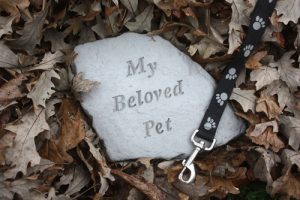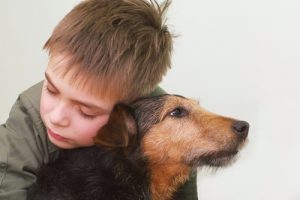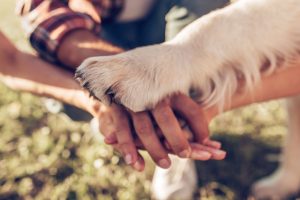Unfortunately, pets grow older. Whether its a bird, cat, dog or horse, pets get older. The differences between an energetic young pup to an older dog is quite amazing but it is a natural process of life. Like our human friends, our pet friends age and understanding the changes, limitations and when it is time to let go are difficult things to accept. Many individuals have a hard time making the decision to euthanize a pet, or say goodbye. This is quite natural since pets are family. It is hard to say goodbye to anyone we love but with animals, the choice is always ours. Animals are like children and do not understand aging or death, but it is up to their human parents to guide them through it. The pet loss grief will be intense, but owners need to be strong for their pet.

Pets need love and presence when the that fateful days comes. After limitations to movement, eating, digestion and quality of life erode, the owner must make the difficult case to help ease the transition of one’s pet to the next life. Sometimes the day is picked in advance, other times, the horrible decision falls suddenly. Regardless, owners need to be there for their pets. They need to hold them and keep them comfortable. They need to ensure their pet dies with comfort and dignity if possible. The simple presence can reassure a pet during his or her passing. This simple act of kindness to a good friend can make it so much easier on the pet.
One thing everyone should remember is pets are parts of our life, but to a pet, we are their entire life. As much as we would like to have our pets live a long as we do, it is not possible. Human life span is almost immortal in relationship to a dog. Humans may have multiple pets and love them all equally without forgetting any, but the owner is the everything to a pet. It is good to remember these faithful friends and grant them the most dignified death possible.
The article, “How to Know When It’s Time to Say Goodbye to a Pet” by Laurie Dove takes a closer look at signs and signals that it may be time to euthanize a pet. The article acknowledges the difficult decision but points out that pets deserve to die with dignity if certain movements or qualities of life are no longer present. Many times it may be a difficult answer, no one answer is white or black in making this difficult decision, but certain elements will appear when the time does come. The article mentions mobility, hygiene, pain, hunger, thirst and energy as all things to take into consideration. Ultimately, Dove states,
“It’s tough see your dog or cat grow old or get sick, but it’s even harder to think about putting them to sleep. Something just doesn’t feel right when you know your pet’s “death” is scheduled via an appointment with their veterinarian — and you had to make that call. While the intensely personal process for making an end-of-life decision for your pet is rife with the complexities surrounding death and grief, it’s a decision that you simply can’t ignore. But how do you know when the time is right?”
“How to Know When It’s Time to Say Goodbye to a Pet”. Laurie Love. October 11th, 2022. HowStuffWorks?
To read the entire article, please click here
Commentary
Pet death loss can be an emotionally devastating experience for many individuals, as it often involves the disruption of a significant bond between animal and owner. In cases where this bond is strong, pet death loss can lead to complicated reactions on the part of the bereaved, including feelings of guilt and intense grief. Such feelings can manifest in various forms such as depression, anxiety, insomnia and rumination. Furthermore, pet death loss has been associated with lower levels of social support. Such losses have been studied extensively within the field of psychology, where it has been characterized as an attachment-based bereavement experience. This loss can also be equal to any type of human loss based on the above considerations.

Knowing When to Let Go
Euthanasia is a difficult and often emotionally charged decision for pet owners, requiring careful analysis of the situation. When confronted with the need to euthanize an animal companion, it is best to consider both physical and emotional factors. On the physical level, veterinarians typically consider whether the pet’s health issues are terminal and/or significantly compromising their quality of life. This act entails the intentional termination of life for a pet suffering from a terminal illness or experiencing severe and irremediable pain in order to alleviate their suffering. In such circumstances, it is important to consider the quality of life for the animal in question, as well as the emotional impact on owners who may be struggling with feelings of guilt or grief.
One should consider a variety of issues. First and foremost, is it a selfish motive keeping a suffering pet alive. True love for a pet sometimes involves sacrificing and allowing an older pet with terminal symptoms to find peace. However, there are signs that one should look for that include dietary changes. Is the animal able to eat, digest, and find nourishment. Is the pet hungry or constantly thirsty? Does the pet have energy? Is the pet in constant pain? Is mobility affected? These are important things to consider when making a difficult decision regarding one’s pet.
It can be very painful to make this decision, but as a pet parent, sometimes tough decisions need to be made for the overall welfare and state of the pet.
Conclusion
Letting go of a pet child is never easy. It is not supposed to be easy. Saying goodbye can be a difficult decision but this decision is always made with love and respect for the dignity of the pet. It is the final option but is also the most merciful option.
If after saying goodbye to one’s pet, one needs pet loss grief counseling, then one should consider working with a professional expressing this type of loss. Many times, individuals are mocked or disregarded after the loss of a pet. This type of disfranchisement is common with pet loss. Individuals do not consider it as important as losing a human friend. The reality is that losing a pet can be equal or even greater. Many individuals grieve very hard over the loss of a pet because pets are family.
If you would like to help others better deal and cope with pet loss, then please review AIHCP’s Pet Loss Grief Counseling Certification. The program is online and independent study and open to qualified professionals seeking a four year certification in Pet Loss Grief Counseling.
Additional Resources
“How Do You Know When to Put a Dog Down?”. Liz Bales. VMD. August 8th, 2019. PetMD. Access here
“Euthanasia: Making the Decision”. August 25th, 2016. American Humane. Access here
“When Should You Euthanize a Pet?”. Jessica Pierce. February 16th, 2012. PsychologyToday. Access here
“How Do I Know When it’s Time?” The Ohio State University. Veterinary Medical Center. Access here
“How to Cope when Your Pet Needs to Be Euthanized”. Chloe Carmichael, PhD and Danielle Blinka, MA, MPA. September 15th, 2021. WikiHow.Pet. Access here









